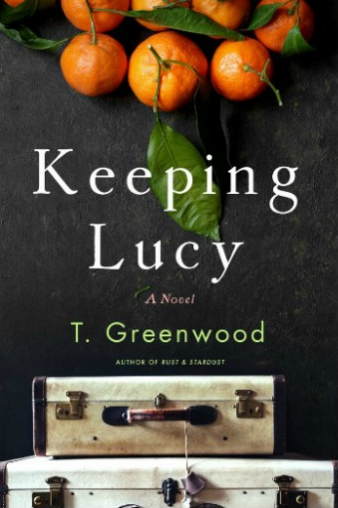Brooke's Pick: Keeping Lucy by T. Greenwood
- Brooke, Public Relations Librarian
- Sep 16, 2019
- 3 min read

Before Ginny Richardson could even lay eyes on her new daughter Lucy, her future was being decided – a future that involved life in an institution, raised away from her family. Born in 1969 with Down Syndrome, Lucy is considered to be a "Mongoloid," a child with no real hope of a life or future – in fact, the doctors, who say she will never be more intelligent than a dog, expect her to die before too long.
Without consulting Ginny, her husband and father-in-law place Lucy in the Willowridge School – it is for her own good, they say, as well as theirs. Ginny mourns Lucy for two long years, wondering daily what ever happened to her little girl, while trying to maintain a good and stable life for her son Peyton and husband Ab. That is, until the day her best friend Marsha shows her a newspaper expose accusing the Willowridge School of horrid acts of abuse and neglect against its disabled children.
Ginny has to see for herself that Lucy is okay and safe, so she pays a visit to Willowridge, only to discover that the news stories didn't even tell the half of it. Shocked and horrified by what she witnesses, Ginny checks Lucy out of school for the Labor Day weekend with no intentions of returning her. She is officially on the run with her own child. Running from the law, running from her husband, and running from a life that has been closing in on her from the day she got married.
T. Greenwood returns after her 2018 hit novel, Rust and Stardust, with a new, captivating story inspired by true events. If you have read Rust and Stardust and loved the way Greenwood pulls you in with engaging dialogue, a compelling storyline, and not a word wasted, then you will equally love Keeping Lucy. You may pick up this book for its intriguing storyline of a mother doing whatever it takes to protect her child, but you will remember it for what it teaches you about how far the rights and stereotypes of women and the disabled have come in our country in the past 50 years.
The America portrayed in Keeping Lucy is one where most women were relegated to a single role – being a wife and a mother. Her opinion is not important, her career – if she even has one – is not important, her needs and wants are not important. She is simply here to serve and support her family. Greenwood thoroughly explores this idea in her new novel, showing that while many women didn’t complain about their familial role, that doesn’t mean that they didn’t wish for more in their life.
The other issue that Keeping Lucy explores is how children with disabilities were viewed by society. Children with Down Syndrome were “sent away” as opposed to being raised by families who could love and nurture them through their disability. Terms such as “retarded,” handicapped,” and “Mongoloid,” were thrown around liberally to describe children with disabilities, often right to the face of the parents or the children themselves. It is not that they were being rude necessarily, it was just the norm.
Readers who love touching, yet impactful stories that stick with you long after you have finished reading them, should definitely pick up Keeping Lucy. Fans of Jodi Picoult’s style of writing, in which the author builds a story around a social issue, will especially love Greenwood’s take … except they may just love Greenwood’s a little bit more. Greenwood takes a more literary approach in telling her story, making this novel feel both entertaining, yet enriching at the same time. If the novel has a fault, it comes in the second half of the book where Greenwood sometimes relies on dramatic twists of fate to keep the momentum of the story going. In all, however, Keeping Lucy is one of the standout literary reads of 2019 for its historical social merit and engrossing storyline.
Rating: **** Stars (I really liked it)
- Brooke, Public Relations Librarian
ARE YOU AND THIS BOOK A GOOD MATCH? DISCOVER MORE WITH NOVELIST APPEALS! Keeping Lucy
GENRE: Historical Fiction; Women's Lives and Relationships TONE: Heartwrenching; High-Drama TIME PERIOD: 1960s; 1970s SUBJECT: Child abuse; Children with Down Syndrome; Determination in Women; Mother and Child; Motherhood; Mother-separated children; Parental kidnapping; Protectiveness in women
IF YOU LIKE THIS BOOK, YOU MAY ALSO ENJOY THESE TITLES:


















Comments